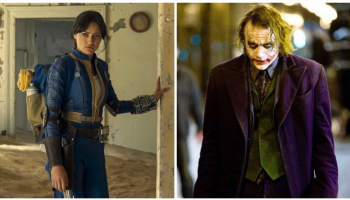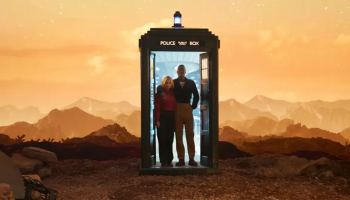
[ad_1]
When Henk Rogers attempted to get the rights to publish Tetris on handheld consoles in 1988, he likely had no idea the mess he would be thrust into. What followed was a year of flying in between Moscow, Tokyo, and various cities in the United States as he attempted to negotiate for video game rights while the Cold War began to crack down the middle. When he finally got the rights, he partnered with Nintendo and put Tetris on the GameBoy in 1989, and the rest, they say, is history. At least, until now. Now, the retelling is up to Hollywood.
The best way to describe Tetris (the film) is by imagining The Wolf of Wall Street by way of a Cold War spy thriller focused on video game rights. A year of Rogers’ life is compressed into a frenetic adventure packed with litigation disputes, worldwide travel, and rights negotiations, all the while Alexey Pajitnov—the game designer who invented Tetris while working at his government job in the USSR—is stuck in the middle of capitalist intervention and a network of Kremlin spies and bureaucrats. With a pace that speeds up faster and faster (culminating in a high-speed car chase through Moscow), and a judicious use of pixel graphics to help with the transitions, the high-stakes race set against the fall of the USSR is an exciting and wonderfully poignant film.
As Rogers attempts to negotiate between USSR-owned Elorg, Nintendo, and the corrupt Soviet government, it’s apparent that he is is truly in over his head. He’s not a spy and he’s not a player, he’s a businessman with a family who’se under a lot of pressure. The plot takes place in board rooms and secret meetings, and while the web of backstabbing, lies, and double-dealings is intricate, keeping the major players limited and focused allows Tetris to operate in a space between understanding every single relationship on screen and being able to enjoy the film simply knowing that the stakes are life-threatening, and wouldn’t it be nice if Rogers and Pajitnov end up best friends? (Rest assured, they do.)
You really feel the pathos of Tetris. What could end up mawkish and overacted is instead a kindly rendered look at two men who are risking everything to support their passion. There are grounded stakes in this film, despite literal spycraft and an appearance from Gorbachov. Nothing is world-ending, but the risks these two men are facing feel as important as the mutually assured destruction that underpinned the time period. Rogers’ family is teetering on the edge of breaking up, his company is at risk, he has no more money, and this one longshot is his last hope at success. Pajitnov has his own struggles with the KGB knocking at his door, threatening his life and the lives of his family. But Pajitnov still manages his moments of heroism and comedy, showing the kind of restraint needed to live under and within the Soviet government, while also praising the resilience of the populace.
G/O Media may get a commission
Both Taron Egerton as Rogers and Nikita Efremov as Pajitnov deliver performances that are restrained and deeply emotive at the same time. Egerton’s comedic timing in the absurd situations Rogers is put into is pitch-perfect; it’s full of very American responses to matters of state that simply do not make sense to him. Efremov’s moments of levity and joy amid his stoic role are really remarkably charming, and if either lead had been less charismatic the film would have fallen apart. It’s these two men that make up the heart of the film, the rest of the characters around them serving as devices for both empathy and motivation.
One of the best parts of this film happens when we realize that there is a full scale breakdown between patriotism, greed, and politics during negotiations. In a government boardroom, amid yelling and back and forth, this idealogical breakdown is mirrored across the miscommunication and double-talk between all these different game publishers. While deeply political, the movie offers only a mild critique, continually brining the focus back to the characters at the core, even amidst nationalist parades and visits to the palace.
Tetris takes what should be a film about business transactions and creates a loving look at nerd culture, gaming history, and the men who risked literally everything for a video game about stacking blocks. It cares so much about details, about giving folks reasons to care about video games the way that Rogers and Pajitnov care about them. Backed by an ‘80s soundtrack and eight-bit beeps, the film is about gaming history, yes, but it’s also about why games are so important. They are fundamental to human nature, they have the ability to create emotional investment, to engage and create change, and they are powerful.
Ultimately, the friendship between Rogers and Pajitnov gives viewers a reason to root for the two of them. Apart they can come off a selfish or stubborn, respectively, but together it’s clear that they care about their work and they care about each other. Their friendship is the missing piece needed to complete the proverbial row, and when everything finally falls into place, Tetris turns into an extremely satisfying film, made all the better when you remember that Rogers and Pajitnov remain friends today.
Tetris begins streaming March 31 on Apple TV+.
Want more io9 news? Check out when to expect the latest Marvel, Star Wars, and Star Trek releases, what’s next for the DC Universe on film and TV, and everything you need to know about the future of Doctor Who.
[ad_2]
Source link






